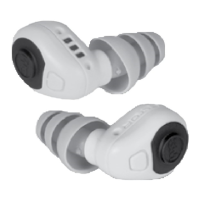3
Note:
• When worn according to the User Instructions, this hearing protector helps reduce exposure
to both continuous noises, such as industrial noises and noises from vehicles and aircraft,
aswellasveryloudimpulsenoises,suchasgunre.Itisdifculttopredicttherequired
and/oractualhearingprotectionobtainedduringexposuretoimpulsenoises.Forgunre,
theweapontype,numberofroundsred,properselection,tanduseofhearing
protection, proper care of hearing protection, and other variables will impact performance.
To learn more about hearing protection for impulse noise, visit www.3M.com/hearing.
• Although hearing protectors can be recommended for protection against the harmful
effects of impulsive noise, the Noise Reduction Rating (NRR) is based on the attenuation
of continuous noise and may not be an accurate indicator of the protection attainable
againstimpulsivenoisesuchasgunre(wordingrequiredbyEPA).
Attenuation Data
3Mstronglyrecommendsttestingofhearingprotectors.TheNRRiscalculatedfrom
laboratory-based attenuation data. Research suggests that many users will receive less noise
reduction than indicated by the NRR. If NRR is used to estimate typical workplace protection,
3M recommends that it be reduced by 50% or in accordance with applicable regulations.
The Noise Reduction Rating (NRR) was obtained with the device powered off.
The level of noise entering a person's ear, when hearing protector is worn as directed,
is closely approximated by the difference between the A-weighted environmental noise
level and the NRR.
Example:
1. The environmental noise level as measured at the ear is 92 dB(A).
2. The NRR is 23 decibels (dB).
3. The level of noise entering the ear is approximately equal to 69 dB(A).
WARNING:3Mstronglyrecommendsttestingofhearingprotectors.
CAUTION: For noise environments dominated by frequencies below 500 Hz the
C-weighted environmental noise level should be used.
CAUTION
• Risk of explosion if battery is replaced by an incorrect type.
• With Lithium ion batteries, there is a risk of fire and burns. Do not open, crush, heat
above 60°C (140°F), or incinerate.
• For greater comfort and safety, remove eartips slowly with a twisting motion to gradually
break the seal.

